Universities and research institutions across North America, Europe, and Asia have moved rapidly to address the Low-Altitude Economy’s growth by developing specialized programs for professionals working below 1,000 meters.
This guide stands as the most complete reference to date, cataloging accredited courses, graduate programs, certificates, technical labs, and targeted trainings that shape the next generation of advanced air mobility talent.
Compilation for this resource draws on official university curricula, institutional publications, and direct outreach to industry-academic partnerships to ensure accuracy and currency through 2025. You’ll find verified information on programs in vertiport engineering, eVTOL maintenance, airspace management, safety standards, electric propulsion, regulatory compliance, and more, all mapped to reflect the distinct technical and operational realities of the LAE.
From Virginia Tech’s FAA-backed Smart Airspace initiative in the United States to Hong Kong’s interdisciplinary master’s in Low-Altitude Economy, every entry has been included following a rigorous review of its relevance, credibility, and depth. No other guide brings together the full spectrum of engineering, operational, regulatory, and maintenance skills in one up-to-date, searchable reference for low-altitude aviation.
Universities and Colleges Offering Advanced Air Mobility Programs
Virginia Tech leads with its Virginia Advanced Air Mobility Smart Airspace Program, a comprehensive research initiative focused on developing low-level routing and instrument flight procedures for advanced air mobility aircraft. This university-led program specifically addresses vertiport operations and community-friendly infrastructure design. Funded by the Virginia Department of Aviation and the Virginia Small Aircraft Transportation Systems Lab, the program aims to create the first FAA-approved flight operations network of its kind in the United States. The initiative connects regions like Blacksburg and the New River Valley to broader metropolitan areas, emphasizing the practical applications of air taxi and cargo operations.
Georgia Tech operates the Vertical Lift Research Center of Excellence (VLRCOE), recognized nationally as a Vertical Flight Heritage Site. The institution offers undergraduate certificates in vertical lift and maintains the Center for Urban and Regional Air Mobility, which researches urban morphologies, population distributions, and airspace constraints. Georgia Tech collaborates on a $6.7 million NASA University Leadership Initiative focused on safety-aware learning systems for advanced air mobility.
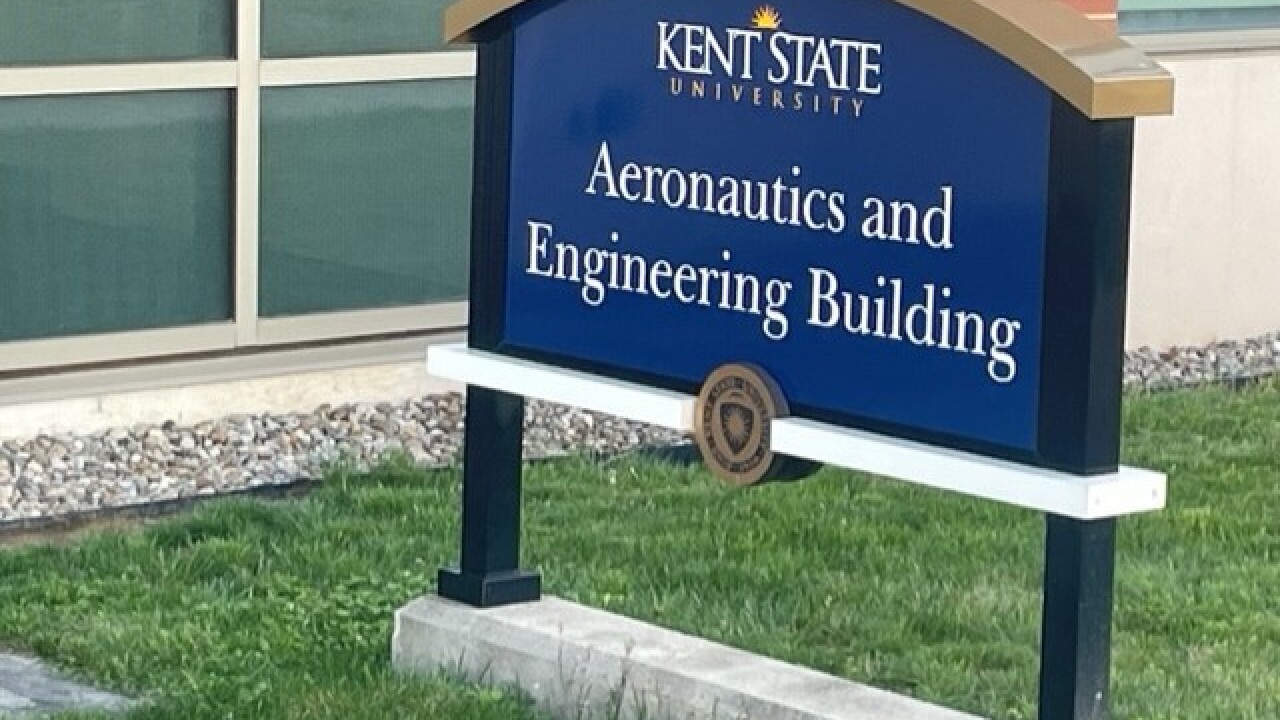 Kent State University’s College of Aeronautics and Engineering
Kent State University’s College of Aeronautics and Engineering
Kent State University’s College of Aeronautics and Engineering has established itself as a leader through multiple funded initiatives totaling over $550,000. The university received a $400,000 grant from the U.S. Department of Defense to launch the Advanced Air Mobility Elevating Northeast Ohio (AAMEN) initiative.
This project addresses the critical integration of unmanned aerial systems and electric vertical takeoff and landing vehicles into the National Airspace System. The program includes beyond-visual-line-of-sight flight training and tests airspace integration technologies using government-owned control stations. Additionally,
Kent State received $150,000 from the Ohio Department of Transportation to design low-altitude airspace surveillance systems optimized for reliability, robustness, and resilience of Ohio’s low-altitude infrastructure.
Purdue University supports AAM education through research initiatives and student competitions. Purdue students won the 2022 Federal Aviation Administration Smart Connected Aviation Student Competition, leading to the formation of Aerovy Mobility, a startup commercializing cloud-based solutions for vertiport infrastructure. The university conducts lithium-ion battery research specific to eVTOL vehicle demands.
Stanford University’s Aeronautics and Astronautics department offers “Advanced Air Mobility: Technology, Business Model, and Regulations” (AA92SI). This course explores policy, economic, and regulatory dimensions of eVTOL technology and urban air mobility through guest speakers from companies like Archer, Joby, Wisk, and government agencies, including the FAA and NASA.
University of Michigan launched M-Air, a public-private partnership providing testing facilities for drones and eVTOL aircraft. The initiative includes a roughly 40-mile flight corridor linking Ann Arbor research facilities to Detroit’s urban testbed. M-Air expands the existing Mcity autonomous vehicle testing facility to include advanced air mobility research.
University of Texas at Arlington offers Airport Design - Airside courses that include vertiport design components. These two-day courses address current issues in airport design for future development, covering aircraft/airport compatibility, geometric design principles, and emerging vertiport requirements.
Graduate and Certificate Programs
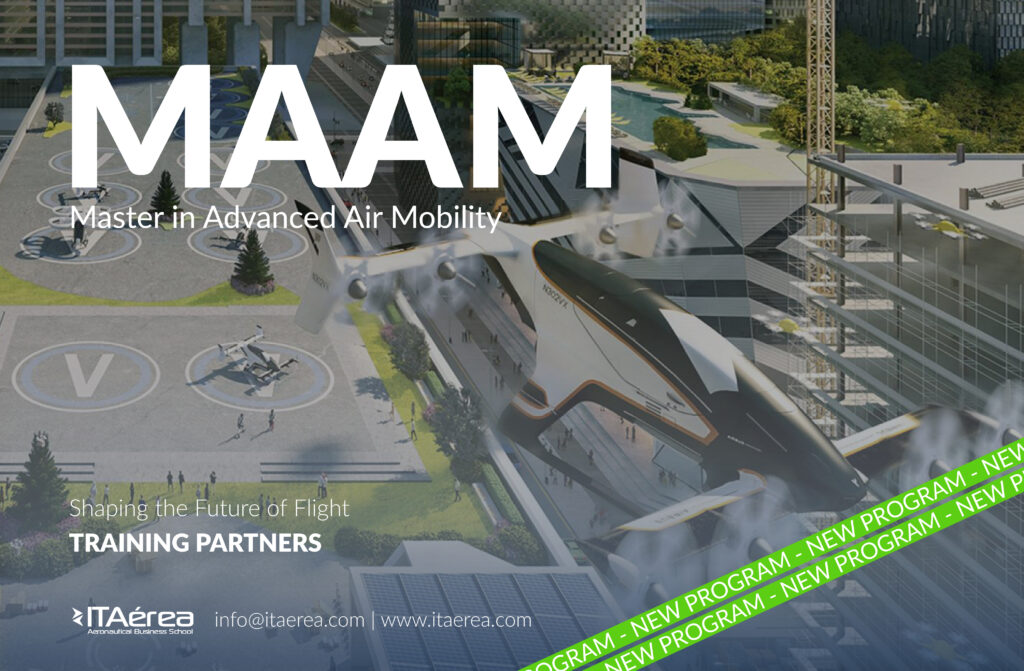 Graduate Certificate in Advanced Air Mobility Systems designed for working professionals
Graduate Certificate in Advanced Air Mobility Systems designed for working professionals
The Institute Technique d’Aérea offers a Master’s in Advanced Air Mobility (MAAM), an executive MBA program designed for professionals eager to lead air transport evolution through cutting-edge AAM technologies and business strategies. This comprehensive program provides an in-depth understanding of economic, regulatory, and operational challenges shaping the future of air mobility.
The curriculum covers urban air mobility, regional aviation, airspace management, sustainability, and investment strategies. Students gain hands-on insights from leading industry experts and work on real-world case studies, preparing them for leadership roles in AAM companies, aviation authorities, air navigation service providers, and investment firms.
Embry-Riddle Aeronautical University - Worldwide provides associate degrees in air transportation and a Master of Science in Airport and Air Mobility Management, which addresses the multi-layered world of airport administration, operations, and leadership in the context of emerging air mobility systems. As one of the most recognized names in aviation education, Embry-Riddle has adapted its programs to include elements relevant to advanced air mobility and urban air transport operations.
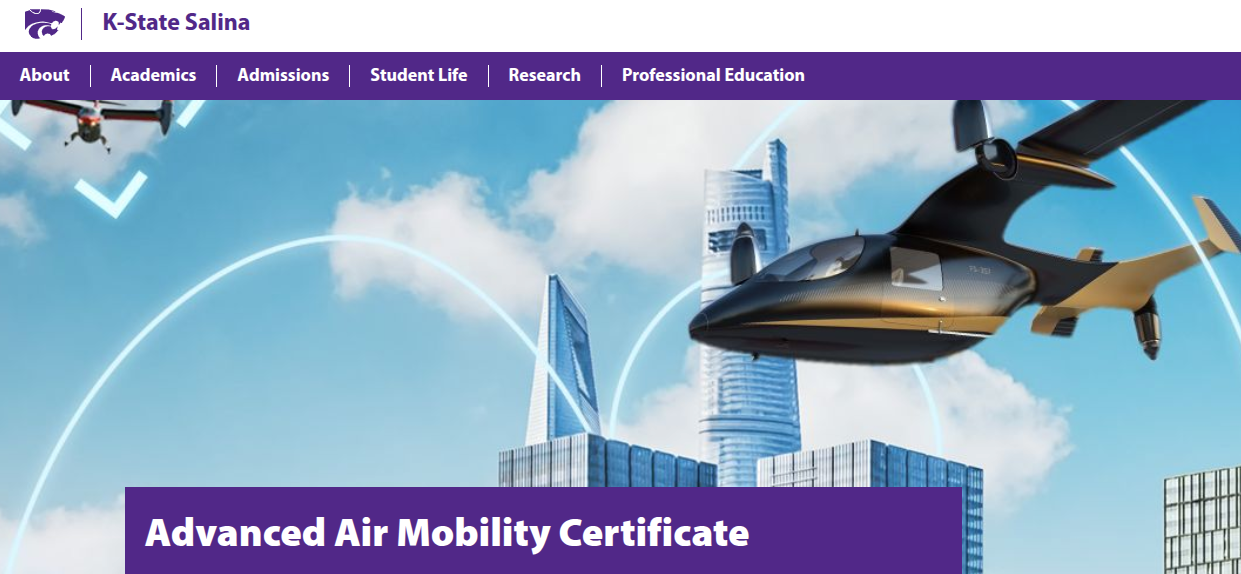 Graduate Certificate in Advanced Air Mobility Systems designed for working professionals
Graduate Certificate in Advanced Air Mobility Systems designed for working professionals
Kansas State University - Salina offers a Graduate Certificate in Advanced Air Mobility Systems designed for working professionals. This online program focuses on aerospace communications, urban canyon environments, electromagnetic threats, and mitigation design for the AAM industry. The certificate addresses the enormous need for skilled graduates who can contribute to realizing the full potential of Advanced Air Mobility applications.
Students learn about communication, navigation, and surveillance fundamentals while working on research projects tackling issues in the CNS realm for safe AAM operations. The program fully stacks into K-State Salina’s Master of Science in Integrated Systems Design & Dynamics, providing a pathway for continued education.
The University of Arkansas introduced a Graduate MicroCertificate in Advanced Air Mobility Autonomous Operations. This focused six-credit-hour program includes unmanned aircraft systems operations management courses and advanced air mobility components, preparing students for leadership roles in the rapidly evolving AAM industry.
Several established aviation programs have incorporated advanced air mobility elements into their curricula. LeTourneau University in Texas offers Bachelor of Science degrees in air transportation that prepare students for the evolving aviation industry. These programs combine traditional aviation knowledge with emerging technologies and business practices relevant to the AAM industry.
Technical Training and Maintenance Programs
Sinclair Community College has developed an Advanced Air Mobility Maintenance Technician short-term technical certificate program. This initiative prepares students for entry-level technician positions in the emerging AAM industry. The college has acquired BETA’s ALIA CTOL Aircraft and a mobile flight simulator to expand its advanced air mobility resources and training capabilities. This partnership with BETA Technologies demonstrates the direct industry connections that enhance practical learning opportunities.
Specialized Professional Education
LYNEports delivers vertiport design training through partnerships with academic institutions, emphasizing software-based design skills crucial for practical field application. These specialized programs complement university offerings by providing targeted expertise in specific operational areas.
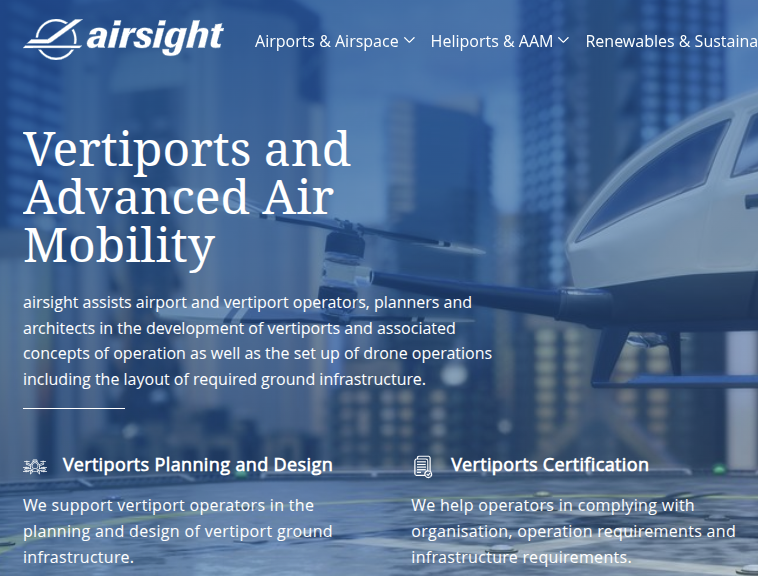 Airsight Vertiport and Advanced A Mobility
Airsight Vertiport and Advanced A Mobility
Airsight Singapore provides specialized professional training through its Vertiports Planning and Design course. This three-day intensive program offers comprehensive coverage of the fast-growing eVTOL aircraft market and vertiport infrastructure requirements. The course aligns with European Union Aviation Safety Agency (EASA) prototype technical specifications and American FAA engineering guidance. Participants learn about eVTOL aircraft characteristics, vertiport configuration and dimensioning, fundamental infrastructural elements, including final approach and takeoff areas, touchdown and lift-off areas, taxiways, stands, and visual aids. The program also covers obstacle restriction, noise assessment, flight procedure design, and operational concepts.
Professional Development and Industry Training
The VERTICON conference series has become a significant platform for education in vertical aviation, offering over 100 educational opportunities annually. While not a degree-granting institution, VERTICON provides Elevations courses (formerly Professional Education Courses) taught by industry experts on subjects crucial to success in vertical aviation, including advanced air mobility applications.
International Expansion
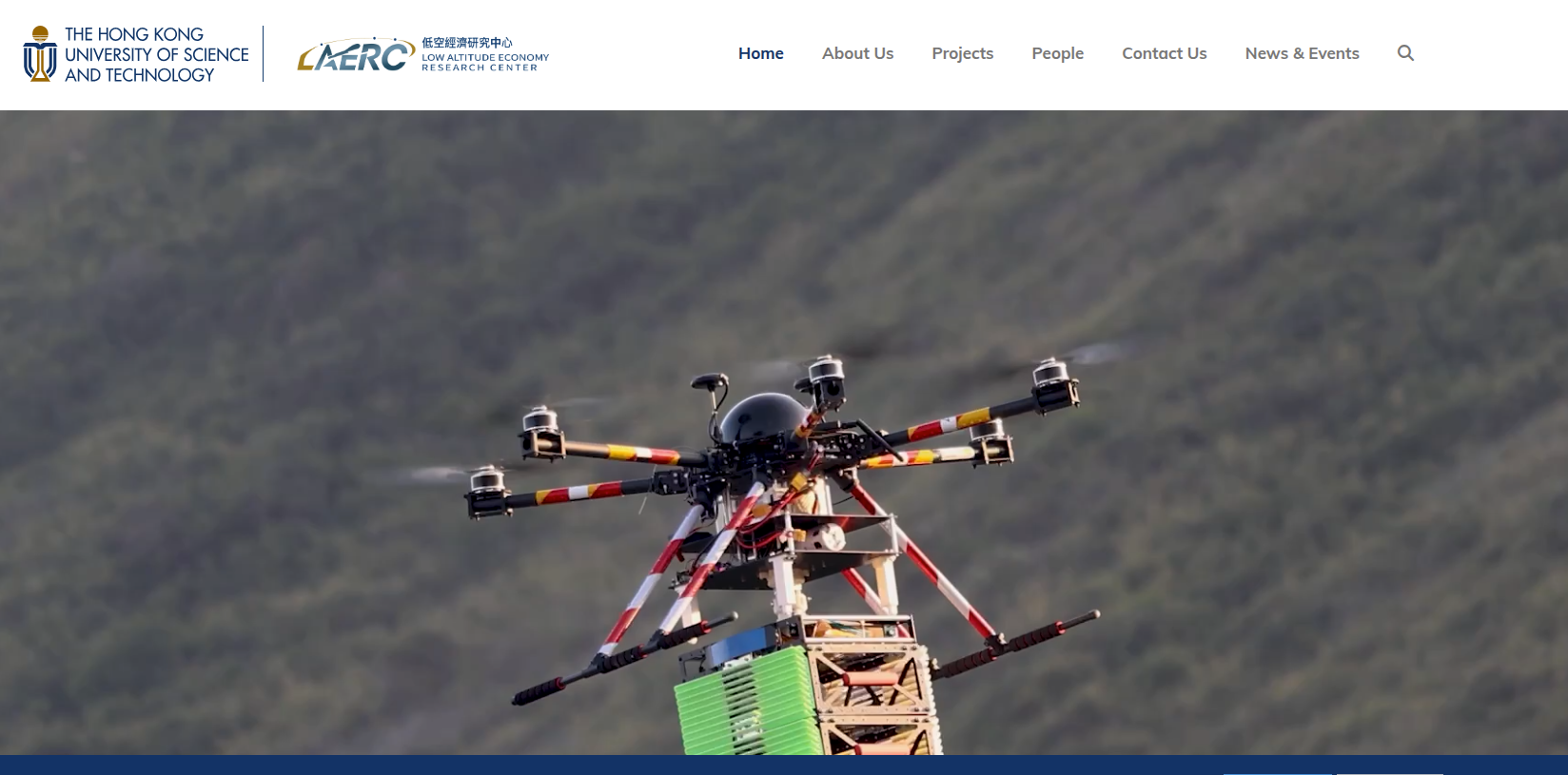 The Hong Kong University of Science and Technology
The Hong Kong University of Science and Technology
The Hong Kong University of Science and Technology established the Low Altitude Economy Research Center in January 2025, focusing on interdisciplinary research in aerial control and digital infrastructure. These institutional developments highlight the growing recognition of LAE’s importance within Hong Kong’s academic landscape.
The Hong Kong Polytechnic University offers a Master of Science in Low-altitude Economy program that began in September 2025, featuring a mixed-mode study format allowing both full-time and part-time options. This program takes an interdisciplinary approach, combining aviation, engineering, control systems, artificial intelligence, and transportation knowledge.
Delft University of Technology (TU Delft) offers a comprehensive Urban Air Mobility online course through its Personal Air Mobility Group. The program combines multi-disciplinary aspects of vehicle design and operation, covering concepts from aerodynamics and aeroacoustics of propulsion systems to powertrain and structural architectures.
Students learn about flight control, trajectory optimization, and maneuverability specific to urban air mobility and its integration into urban environments. The course includes discussions on optimal vertiport layout based on mission and urban environment constraints. Participants receive a 50% discount on the Delft International Conference on Urban Air Mobility, demonstrating the program’s strong industry connections.
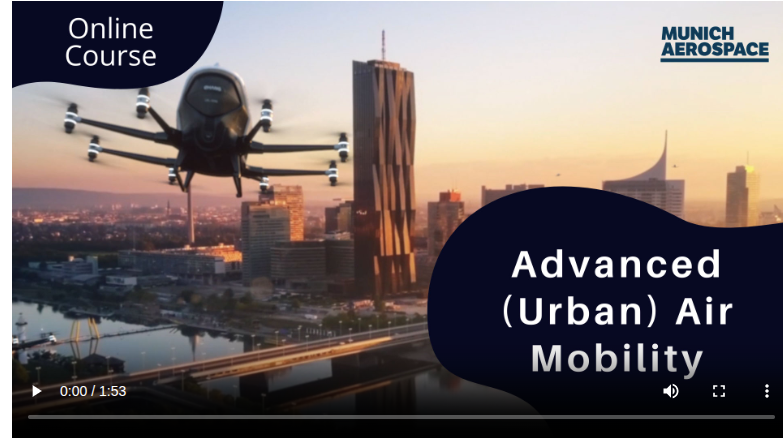
Munich Aerospace partnered with the Technical University of Munich Institute for Lifelong Learning to launch a free Massive Open Online Course on Urban Air Mobility. This interactive program includes ten modules covering technical, social, and legal challenges of urban air mobility. International lecturers from teaching, industry, and research provide expertise on current and future-oriented aerospace topics.
The course features experts from the Technical University of Munich, Georgia Institute of Technology, Concordia University, Universidade de São Paulo, German Aerospace Center, Airbus Urban Mobility, University of the Bundeswehr Munich, Bauhaus Luftfahrt, and the German Federal Ministry of Transport and Digital Infrastructure.
Industry-Academic Partnerships
University of California, Berkeley signed a Memorandum of Understanding with LYNEports to deliver comprehensive airspace planning and vertiport design training. Professor Simon Schleicher leads this collaboration through UC Berkeley’s Department of Architecture, developing graduate courses focused on vertiport planning and infrastructure.
The program introduces students from various professional backgrounds to airspace design challenges and opportunities through hands-on projects and practical applications using cutting-edge software. This partnership prepares students for careers in the rapidly growing advanced air mobility field.
Georgia Institute of Technology actively participates in international urban air mobility education initiatives. Professor Laurie Garrow contributed to Munich Aerospace’s MOOC development, focusing on demand modeling for urban air mobility. The university’s involvement demonstrates its commitment to advancing AAM education through collaborative international programs.
Universities worldwide have recognized that the Low-Altitude Economy requires dedicated educational pathways rather than modified traditional aviation programs. From Virginia Tech’s airspace programs to Hong Kong’s specialized master’s degrees, institutions offer diverse training approaches tailored to different professional needs.
Technical maintenance programs at community colleges like Sinclair prepare hands-on technicians, while executive MBA programs like ITAérea’s MAAM target industry leaders. Graduate certificates from Kansas State and Arkansas serve working professionals, and comprehensive research centers at Kent State and Virginia Tech advance theoretical foundations.
This educational expansion spans globally, with Hong Kong’s multiple university programs and European initiatives like TU Delft’s courses demonstrating that LAE education represents a worldwide shift beyond traditional aerospace engineering. These interdisciplinary programs combine technical knowledge with regulatory understanding, business acumen, and operational expertise.
As the Low-Altitude Economy continues expanding, these educational initiatives provide the essential human capital foundation for industry growth, representing what will likely become standard components of aviation and aerospace education worldwide.
Resources:
The table presents a concise survey of university courses, research initiatives, certificates, and professional trainings now devoted to advanced air mobility, drone logistics, and vertiport infrastructure.
| Name | Program Type | Description |
|---|---|---|
| Virginia Tech | Research Program | Virginia Advanced Air Mobility Smart Airspace Program developing low-level routing, instrument flight procedures, vertiport operations, community-friendly infrastructure. Link |
| Georgia Tech | Undergraduate Certificate and Research | Vertical Lift Research Center of Excellence offers undergraduate certificates, urban air mobility research, NASA collaboration. Link |
| Kent State University | Research Initiative | Advanced Air Mobility Elevating Northeast Ohio (AAMEN) with DoD funding for UAS and eVTOL National Airspace integration. Link |
| Purdue University | Research and Competition | Supports AAM research, student competitions, lithium-ion battery research, vertiport infrastructure technology. |
| Stanford University | Course | Advanced Air Mobility: Technology, Business Model, and Regulations exploring eVTOL technologies, policy, regulations. Link |
| University of Michigan | Public-Private Partnership | M-Air provides drone and eVTOL testing facilities with flight corridor linking Ann Arbor to Detroit testbed. Link |
| University of Texas at Arlington | Short Course | Airport Design (Airside) course including vertiport design covering airport compatibility and design principles. Link |
| Institut Technique d’Aérea | Executive MBA | Master’s in Advanced Air Mobility (MAAM) covering economics, regulation, sustainability in AAM. Link |
| Embry-Riddle Aeronautical University | Master’s Degree | Master of Science in Airport and Air Mobility Management focusing on airport leadership with AAM elements. Link |
| Kansas State University - Salina | Graduate Certificate | Graduate Certificate in Advanced Air Mobility Systems focusing on aerospace communications, urban canyon environments. Link |
| University of Arkansas | Graduate MicroCertificate | Graduate MicroCertificate in Advanced Air Mobility Autonomous Operations preparing students for leadership. Link |
| LeTourneau University | Bachelor’s Degree | Bachelor of Science in Air Transportation integrating AAM related technologies and business practices. Link |
| Sinclair Community College | Technical Certificate | Advanced Air Mobility Maintenance Technician certificate preparing entry-level AAM technicians. Link |
| LYNEports | Professional Training | Vertiport design training emphasizing software skills and practical field applications. Link |
| Airsight Singapore | Professional Training | Vertiports Planning and Design course covering eVTOL market, vertiport design, flight procedures. Link |
| VERTICON Conference | Professional Development | Educational platform offering courses on vertical aviation and advanced air mobility applications. Link |
| Hong Kong University of Science and Technology | Research Center | Low Altitude Economy Research Center focused on aerial control and digital infrastructure. Link |
| Hong Kong Polytechnic University | Master’s Degree | Master of Science in Low-altitude Economy combining aviation, engineering, AI, and transportation. Link |
| Delft University of Technology (TU Delft) | Online Course | Urban Air Mobility course covering vehicle design, flight control, vertiport layout. Link |
| Munich Aerospace & Technical University of Munich | MOOC | Free Massive Open Online Course on Urban Air Mobility covering technical and legal aspects. Link |
| University of California, Berkeley | Graduate Course | Vertiport planning and airspace design training in collaboration with LYNEports. |
| Georgia Institute of Technology | Research and Collaboration | International urban air mobility education initiatives and research on demand modeling. Link |




